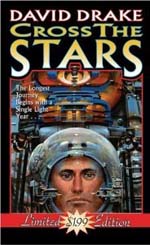 AFTERWORD: WHERE I GET MY IDEAS
AFTERWORD: WHERE I GET MY IDEAS
If you decide to write about far-famed Achilles, make him active, hot-tempered, inexorable, and fierce; let him deny that laws were made for him, let him think his sword rules all. –Horace, The Art of Poetry (lines 120-2)
My undergraduate double major was history and Latin, and I continued to take Latin courses while I was in law school in a laughable attempt to stay sane. Reading Latin centers me. (Note “laughable” in the previous sentence.)
A story doesn’t depend on the language in which it’s told, and a story that’s been around for several thousand years is likely to be a very good story. While rereading The Odyssey (in translation; Ben Jonson would be even more slighting about my Greek than he was about Shakespeare’s) I remarked to a friend that the story would make an excellent Western.
And as I said that, a light dawned. The Odyssey would make a heck of a space opera as well, though translating Homer’s story to an SF idiom would take some subtlety if I were to avoid being absurd. For example, I couldn’t just have my hero land on a planet of one-eyed giants who shut him and his crew in a cave. But what about an automated city that . . . ?
I did a precis of The Odyssey and plotted my story around that armature, focusing always on situations that would serve the same structural purposes that Homer had achieved in his medium. Then I wrote Cross the Stars.
By the way, the Cyclopes appear twice in The Odyssey: once in direct conflict with Odysseus (which everybody remembers) and once as the creatures whose savage attacks drove the Phaecians out of their original home. If you’ve just finished reading Cross the Stars, you may recall a passing reference to giant one-eyed mutants. The latter, like the local creature called the argus and other asides in my novel, is homage to the man/men/woman who wrote The Odyssey; and who is, for my money, the greatest literary genius of all time.
As I was writing Cross the Stars I commented to the same friend that while The Odyssey translated easily to other media, The Iliad (perhaps an even greater achievement) was too fixed in its own cultural idiom to be used the way I did the other. For a long time I believed that I couldn’t use The Iliad at all in my fiction.
One day I was rereading Horace’s Ars Poetica and came to the quotation I’ve translated as the epigraph to this essay. Homer is the only source for the character of Achilles (which Horace summarizes with his usual succinct brilliance), but the character can have a life outside the cultural confines of The Iliad. There are and always have been men (and here I mean “male human beings”) like Achilles; Alexander the Great made a conscious attempt to model his life on the character (and succeeded, in my opinion, only too well).
So I thought about the problem for a long while, then wrote The Warrior. I set the piece (a short novel) in the Hammer universe, as I had Cross the Stars before it, but The Warrior was straight military–as surely as The Iliad is. I used the milieu of modern warfare, of tanks rather than armored spearmen, and the background has no connection with the Siege of Troy.
But remember, Homer didn’t say he was writing about the Siege of Troy: I sing the wrath of Achilles. . . .
Not all of my plots come from classical (or even historical) sources, but most of them do. That’s not only because of my personal taste, but because I believe (with Shakespeare) that literature wich survives the buffeting of time is worth a second or thirty-second look.
I opened with a quote from Horace. I’ll close with another one: I have builded a monument more lasting than bronze. . . . Horace did; and Homer did, and Apollonius did, and so many others did. I’m proud to be able occasionally to stand on their magnificent structures.
–Dave Drake, 1994
Cross the Stars. Hammer’s Slammers Series. 1984, New York, NY: Tor. 342 p. 0812536142 (pb). $2.95.
————– 1994, New York, NY: Tor. 342 p. 0812509994 (pb). $2.95.
————– 1999, Riverdale, NY: Baen. 309 p. 0671578219. $1.99.